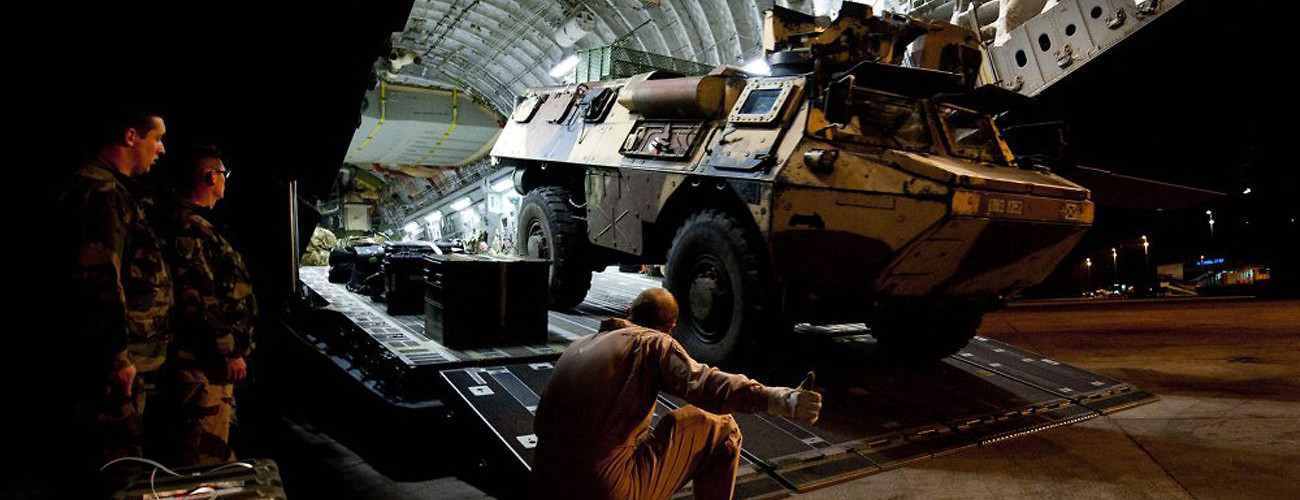A French armored vehicle is unloaded in Bamako, Mali (Flickr/Defence Images)
The recently announced plans by the French minister of defense to reduce French forces in the Central African Republic (CAR) could potentially have adverse consequences on the political and humanitarian situation in the country. The plan as outlined seeks to reduce French forces and convert them into a rapid reaction force that will support the UN Multidimensional Integrated Stabilization Mission in the Central African Republic (MINUSCA). The diminished force will receive new capabilities that will make it more agile and capable of undertaking reconnaissance missions. However, without a comprehensive peace agreement in place, the expected withdrawal of the European Union Force in CAR (EUFOR RCA) in March 2015, and MINUSCA not reaching full operational capacity, this reduction risks increasing insecurity and prolonging one of the world’s worst humanitarian crises.
Security Council Resolution 2127 on December 5, 2013, called for member states to support the African-led International Support Mission to the Central African Republic (MISCA) and authorized the use of force as necessary against armed groups. French President François Hollande announced his decision to reinforce French forces in CAR to prevent the imminent humanitarian disaster in the country.
Operation Sangaris was instrumental in providing logistical and material support to African Union forces before they were re-hatted by the UN. They have also contributed to the enhanced security conditions in Bangui and parts of CAR which have allowed the UN to begin deploying military, police, and civilian personnel but also allowed for humanitarian actors to reach vulnerable groups in remote areas. Their performance with regard to halting sectarian violence has been debatable but they have provided a secure environment for the delivery of humanitarian assistance to vulnerable groups in remote areas. Currently the size of Operation Sangaris is around 2,000 soldiers with areas of operations in the West (Bangui and Boda); in the East (between Beloko and Bossembele); and in the South East (Sibut-Dekoa-Bria).
Over the last 12 months, French forces have been engaged in daily battles with heavily armed ex-Seleka and anti-Balaka forces. French forces continue to be key enablers of security, and their premature troop reduction before MINUSCA reaches its full strength of 10,000 troops by the end of April 2015 could adversely affect the security and humanitarian situation.
No Peace to Keep
With a history of bad governance, insecurity, and half-hearted interventions resulting in recidivism immediately after international attention and engagement have waned, CAR remains at great risk of returning to violent conflict. Recent claims by French military leaders that security and economic activities have improved cannot be the basis of troop reductions especially in the face of daily sectarian violence and armed groups that continue to commit gross human rights violations.
Just three weeks ago, ex-Seleka forces camped in Bangui rioted against a relocation exercise conducted by the International Organization for Migration (IOM) and threatened to blow up a munitions depot in the heart of the capital if their demands for higher relocation compensation were not met. Also promises made by the anti-Balaka to lay down their arms and transform into the Central African Party for Unity and Development (PCUD)—a political party that will participate in national elections—are particularly suspect in the absence of a strong command and control structure among their forces as well as a national disarmament mechanism to monitor compliance.
These recent examples highlight the complex dynamics adversely affecting the security situation. As long as armed groups are using intimidation and violence to influence political outcomes, the situation in CAR remains fragile and requires international forces to mitigate these tensions by creating a secure space for peaceful political dialogue, reconciliation, and the extension of state authority.
Practical Exit Strategy
With transitional authorities proving increasingly incapable of finding a lasting political solution, the French will be required to provide an armed presence. The stalled politics have directly contributed to over 187,000 people fleeing from CAR to neighboring states and has brought the total number of refugees and those displaced internally to more than 850,000. The recently announced Bangui Forum expected to be held in early 2015 will consider how to reconcile the country and prepare for inclusive national elections. This national dialogue process will require the continued presence of French forces to ensure that armed groups do not adversely disrupt or influence it.
Since its inception, Operation Sangaris has cost the French an estimated one million USD a day. So, justifying its continued presence to a domestic audience becomes challenging in light of the deployment of MINUSCA. But MISCA contingents re-hatted into MINUSCA are still without vital contingent-owned equipment due to procurement and logistical challenges resulting in the peacekeeping operation’s reduced operational efficiency.
Operation Sangaris’ exit strategy planning needs to be based on: i) an inclusive political agreement; ii) national disarmament and reconciliation; iii) MINUSCA reaching full operational capacity and; iv) a general reduction of violence across CAR. Since the deterioration of the security situation, CAR remains one of the world’s largest humanitarian crises. Twelve months ago, the president of France made alleviating the humanitarian situation one of the many objectives of Operation Sangaris, but with this still not achieved, the planned reduction of French forces remains premature.





